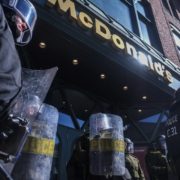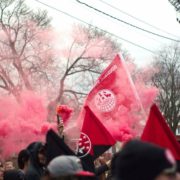The poor white and poor black are in the same boat
Anticapitalism egg racism ? One and the other, met many black American activists, in the years 1960, advocated class warfare rather than the alliance of blacks against whites.
A black American union. Philip Randolph was optimistic 1963 : "The protests of blacks are only the first tremors of the" subclass ". Blacks are in the street, but other unemployed, all races, will join them [1]. " It was not the case. Many black activists were nevertheless convinced that the fight antiracist had real meaning unless it was also anti-capitalist ; that blacks would only become free in the day that the operation would have disappeared.
For Malcolm X himself, the liberation of the black people was inseparable from a fight against capitalism. Returning at the end of his life to his previous positions, the former member of the "Black Muslims" (from which he was excluded in March 1964) ceased to conceive of the struggle in exclusively racial terms. “We are living in a revolutionary era, and the revolt of black Americans is an integral part of the rebellion against oppression and colonialism that characterizes this era ", he explains in his last speech, the 18 February 1965. « […] It would be wrong to define the black revolt as a simple racial conflict between blacks and whites., or as a purely American problem. On the contrary, today we are witnessing the general rebellion of the oppressed against their oppressors, exploited against their exploiters. The black revolution is not a racial revolt [2]. »
Destroying racism is not enough
This analysis inspired Huey P. Newton et Bobby Seale, who founded, in Oakland (California), le Black Panther Party (BPP) in 1966. Revolutionary, socialist and internationalist, Huey P. Newton didn't just say he was proud to be black : “We believe it is important for us to admit our origin and identify with the revolutionary black people of Africa and with people of color around the world, he said in March 1968. But go back to old ways just for the sake of it, we don't see the need. And by the way, we assert that the only culture worthwhile is revolutionary culture, for the change, for the best [3]. »
In spring 1963, one in two blacks lived below the poverty line (against a fifth of the white population [4]). For Seale and Newton, to fight for the liberation of blacks therefore meant to fight capitalist exploitation, alongside all the exploited and all those who rejected this system, including whites who, if they are real socialists, cannot be racist, as Malcolm X pointed out shortly before he was assassinated. Simultaneously, for the early "Panthers" (who bought their first weapons by selling Mao's Little Red Book), it wasn't enough to be black to be a comrade. In 1968, Eldridge Cleaver, "BPP Minister of Information", emphasizes that race cannot be the only unifying element, because "there are classes in the black community […]. They have diverse interests that conflict with those of the black masses, and they will jealously preserve them. We call on the black bourgeoisie to return to its people, we leave the door open for him, but I think we have to anticipate that a good number of its members will not come back to us [5] ».
The farm has no color
At the end of the years 1960, many black activists believe that ending racism will not be enough to secure the liberation they aspire to. At the conference of the Latin American Solidarity Organization, in Cuba in 1967, Stokely Carmichael warns that the fight led by blacks must not end in "creating societies where, instead of white leaders, black rulers will rule the existence of the black masses, where the black money will go to spill in a few black pockets ; we want it to go to a common pocket. The society we want to create among blacks is not a society of capitalist oppression because, by its very nature, capitalism cannot create structures free from exploitation. We are fighting for a redistribution of wealth and for the end of private property in the States- United. […] Even if we liquidate racism, we will not necessarily destroy, and at the same time, operations. So we have to constantly launch attacks in both directions., have my eyes constantly fixed on the two horns of the bull [6] ».
At the time, class solidarity, revolutionary, was also put into practice. In Detroit, a League of Revolutionary Black Workers was created after the riots in 1967. She mobilized thousands of people until 1971, year in which 2 000 workers in the wood industry, Whites and blacks combined, opposed a new method of measuring lumber in Mississippi that led to lower wages.
However, class solidarity, which would have made it possible to overcome both the civil rights movement of the years 1960, spontaneous urban revolts and separatism advocated by some supporters of Black Power, was not the project of the majority of black activists. A few even felt that the liberation was passing, on the contrary, by the development of a "black capitalism". Among them, Nathan Wright even went so far as to explain, in 1967, that the important thing was not to make the unemployment disappear (an impossible goal, according to him), but to make sure that there are as many unemployed blacks as there are whites : "Some economists believe that the traditional economic system in our culture needs a reserve of slack resources at its base. If so - and the constant existence of this reservoir forces us to recognize this necessity -, the elementary question of subsistence becomes a dangerous social problem when the relegated group is not heterogeneous, in other words when it is recruited from one and the same ethnic group [7]. »
Too late, the anti-capitalism of some black American activists failed to overcome this kind of conception. Racism, it is true, was not always a stranger to white workers who, threatened by economic downgrading and competition in the job and real estate market, sometimes tended to attribute them to the conquests of the Civil Rights Movement. The alliance between the workers did not come true. Capitalism would therefore make the most of racial polarization by putting the exploited in competition., but also by taking advantage of the bogged down of part of the revolutionary militants in racial separatism and in the clandestine armed struggle. However, as Nate Shaw explained, black farmer imprisoned in the years 1930 : " It's simple as hello. Poor white and poor black are in the same boat. It's the big guys who separate them on purpose. The power of control, the rich have it. […] The rich class stick together and Poor White is on the other list with the colored guys [8]. »
Published in Le Plan B n ° 07, April-May 2007
Notes
[1] Quoted in Howard Zinn, A People's History of the United States, Agone, 2002, p. 526.
[2] Malcolm X, The Black Power, The Harmattan, 1993 (1re éd. : 1965), p. 161.
[3] Cited in Robert L. Allen, History of the black movement in the United States, FM, 1971, "Small Maspero collection", t. I, p. 169.
[4] Zinn, on. cit., p. 519-520
[5] The Guardian, 13.4.68. Cited in Allen, on. cit., t. II, p. 83.
[6] Allen, on. cit., t. II, p. 63.
[7] Nathan Wright, Black Power and Urban Unrest, 1967, cited in Allen, on. cit., p. 159.
[8] Quoted in Zinn, on. cit., p. 451.





Leave a Reply
Want to join the discussion?Feel free to contribute!